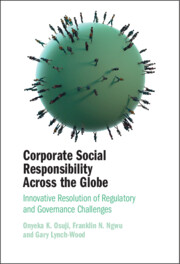 Corporate Social Responsibility Across the Globe
Corporate Social Responsibility Across the Globe Book contents
- Corporate Social Responsibility Across the Globe
- Corporate Social Responsibility Across the Globe
- Copyright page
- Epigraph
- Contents
- Figures
- Table of Cases
- Table of Legislation
- 1 Introduction: The Centrality of Regulation in Corporate Responsibility
- Part I Regulation Concepts, Paradigms and Approaches for Corporate Social Responsibility
- Part II Infusing Corporate Social Responsibility in Corporate Governance
- 5 CSR, Directors and Top Management Officers: Responsibility and Accountability Pathways
- 6 Structural Limits and Structural Opportunities for Shareholder Regulation
- 7 SMEs: An Untapped Platform for Sustainable CSR Penetration and Practice in Developing and Emerging Markets
- Part III Stimulating Private Regulation of Corporate Social Responsibility
- References
5 - CSR, Directors and Top Management Officers: Responsibility and Accountability Pathways
from Part II - Infusing Corporate Social Responsibility in Corporate Governance
Published online by Cambridge University Press: 15 June 2023
- Corporate Social Responsibility Across the Globe
- Corporate Social Responsibility Across the Globe
- Copyright page
- Epigraph
- Contents
- Figures
- Table of Cases
- Table of Legislation
- 1 Introduction: The Centrality of Regulation in Corporate Responsibility
- Part I Regulation Concepts, Paradigms and Approaches for Corporate Social Responsibility
- Part II Infusing Corporate Social Responsibility in Corporate Governance
- 5 CSR, Directors and Top Management Officers: Responsibility and Accountability Pathways
- 6 Structural Limits and Structural Opportunities for Shareholder Regulation
- 7 SMEs: An Untapped Platform for Sustainable CSR Penetration and Practice in Developing and Emerging Markets
- Part III Stimulating Private Regulation of Corporate Social Responsibility
- References
Summary
This chapter investigates how the effectiveness of corporate social responsibility (CSR) can be enhanced through provisions for the responsibility and accountability of individuals, such as directors, who hold key positions or have significant influence on the corporate decision-making process. It draws on the organic theory of the corporation, tone-at-the-top organisational theory, and resource dependency, agency and stewardship theories to demonstrate an anthropocentric approach to corporate governance. This approach identifies critical corporate insiders for CSR-related responsibilisation and accountability.
Keywords
- Type
- Chapter
- Information
- Corporate Social Responsibility Across the GlobeInnovative Resolution of Regulatory and Governance Challenges, pp. 99 - 131Publisher: Cambridge University PressPrint publication year: 2023
